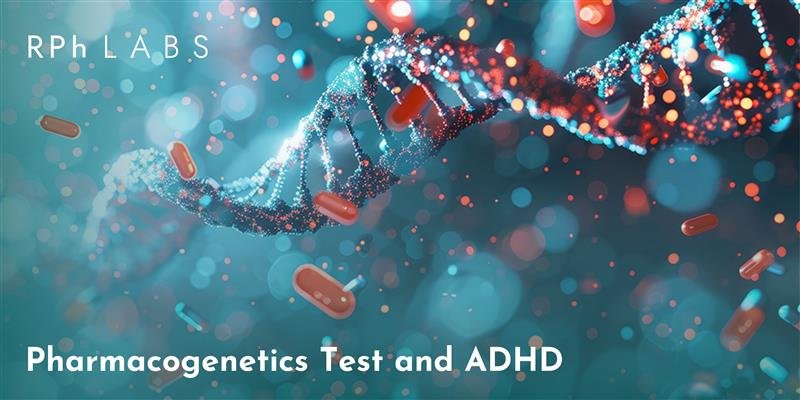
Pharmacogenetics Test and ADHD
Attention-Deficit/Hyperactivity Disorder (ADHD) affects millions in the United States. According to the CDC, approximately 6 million children between the ages of 3–17 have been diagnosed with ADHD, while millions of adults also live with this condition. Treating ADHD effectively often involves trial and error with various medications and dosages, leading to prolonged discomfort for patients as they wait to see which treatment works best for them. Pharmacogenetics tests give insights into your genetic makeup, helping doctors to prescribe the medications that suit your unique DNA.
Key Takeaways
What is a Pharmacogenetics Test?
Does Adderall Treat ADHD?
Common Medications Used to Treat ADHD
How Does a Pharmacogenetics Test Benefit ADHD Treatment?
What is a Pharmacogenetics (PGx) Test?
A pharmacogenetics test analyzes an individual’s genetic profile to predict their response to certain medications. This field of study emerged in the late 20th century, and its potential in healthcare is transformative. By examining variations in genes that affect drug metabolism, doctors can recommend medications that are likely to work best for a patient, reducing side effects and improving outcomes.
Pharmacogenetics is particularly beneficial for mental health conditions like ADHD, where individual responses to medications vary significantly. The test is non-invasive, typically requiring a cheek swab or saliva sample, making it simple and convenient for patients of all ages.
Potential Benefits of Pharmacogenetics Testing
Reduced Trial and Error: Instead of experimenting with various medications, doctors can choose drugs that are more likely to be effective based on genetic results.
Tailored Dosing: The test helps determine whether a patient metabolizes a drug quickly, normally, or slowly, enabling doctors to adjust doses accordingly.
Minimized Side Effects: Since the medications are tailored to a patient’s genetic makeup, the risk of adverse effects can be significantly reduced.
Does Adderall Treat ADHD?
Yes, Adderall, a combination of dextroamphetamine and amphetamine, is one of the most commonly prescribed medications for ADHD. It works by increasing the availability of certain neurotransmitters in the brain, such as dopamine and norepinephrine, which help improve attention and reduce impulsivity.
However, Adderall may not be suitable for everyone due to differences in how individuals metabolize amphetamines. This is where pharmacogenetics testing proves valuable, helping to determine whether Adderall or another medication would be more effective for a particular patient.
Common Medications Used to Treat ADHD
The FDA-approved medications for ADHD fall into two main categories:
Stimulants
Stimulants work by primarily increasing the levels of two key brain chemicals (neurotransmitters), Dopamine and Norepinephrine. Dopamine plays a crucial role in focus, motivation, and reward. While, Norepinephrine helps with attention, alertness, and arousal.
Stimulants are considered first-line treatments for ADHD because they effectively increase focus and control impulsive behavior. The following are common prescription stimulants used to treat ADHD:
Adderall (Amphetamine/Dextroamphetamine)
Dosage: 5 mg to 30 mg (taken 1–3 times daily).
Duration of Action: Immediate-release Adderall typically lasts about 4 to 6 hours per dose.
Ritalin (Methylphenidate)
Dosage: 5 mg to 20 mg (taken 2–3 times daily).
Duration of Action: Immediate-release Ritalin generally lasts about 3 to 4 hours per dose.
Vyvanse (Lisdexamfetamine)
Dosage: 10 mg to 70 mg (once daily).
Duration of Action: Vyvanse is designed to last approximately 10 to 13 hours per dose.
Non-Stimulants
Unlike Stimulants that work by increasing both dopamine and norepinephrine, non-stimulants work by increasing norepinephrine only. These medications have a lower potential for misuse or dependence.
Non-stimulants are often prescribed when stimulant medications are not effective or cause significant side effects. Following are some of the common non-stimulant medications:
Strattera (Atomoxetine)
Dosage: 40 mg to 100 mg (once or twice daily).
Duration of action: Up to 24 hours
Intuniv (Guanfacine ER)
Dosage: 1 mg to 4 mg (once daily).
Duration of action: Up to 24 hours
Kapvay (Clonidine ER)
Dosage: 0.1 mg to 0.4 mg (once or twice daily).
Duration of action: Up to 24 hours
How Does a Pharmacogenetics Test Benefit ADHD Treatment?
When you take medication, your body metabolizes it using specific enzymes. Some people have genetic variations that make these enzymes work faster or slower than normal, affecting how the drug is absorbed, distributed, and eliminated from the body. For example:
Rapid Metabolizers: They may break down a drug too quickly, resulting in lower efficacy.
Poor Metabolizers: They may metabolize a drug too slowly, leading to increased side effects.
Normal Metabolizers: They process drugs at an expected rate, leading to predictable outcomes.
Pharmacogenetics testing identifies your metabolic type, helping doctors select medications and dosages that align with your unique genetic makeup. For ADHD, this means that rather than starting with a standard dose and adjusting it over time, doctors can prescribe the most suitable medication and dose from the outset, improving the likelihood of success.
Conclusion:
PGx test analyzes your genes to determine how your body will respond to medications. Pharmacogenetics testing benefits ADHD treatment by eliminating much of the guesswork involved in prescribing medications. With insights into how your body processes different drugs, your healthcare provider can create a tailored treatment plan that improves outcomes, minimizes side effects, and speeds up the path to effective management of ADHD.
If you or a loved one is dealing with ADHD and struggling to find the right medication, consider undergoing a pharmacogenetics test for a more personalized approach to treatment.
References:
https://my.clevelandclinic.org/health/treatments/11766-adhd-medication
http://www.additudemag.com/short-acting-stimulants-long-acting-stimulants
https://www.drugs.com/medical-answers/how-long-take-strattera-work-3576963/



Leave a Reply